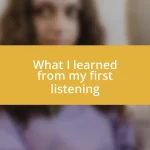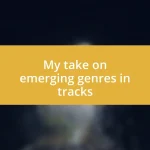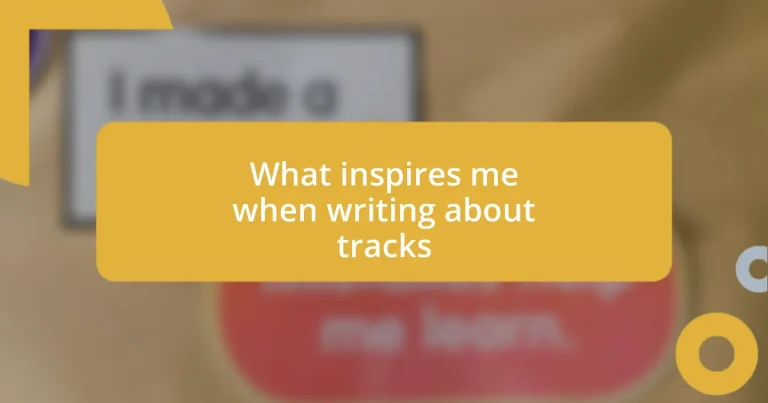Key takeaways:
- Personal experiences enhance writing by evoking emotions tied to specific songs, creating deeper connections with readers.
- Understanding music genres fosters appreciation for diverse narratives, enriching analysis and allowing for exploration of evolving musical landscapes.
- Maintaining authenticity in writing is crucial, as sharing genuine emotions resonates with readers and builds meaningful connections through shared experiences.
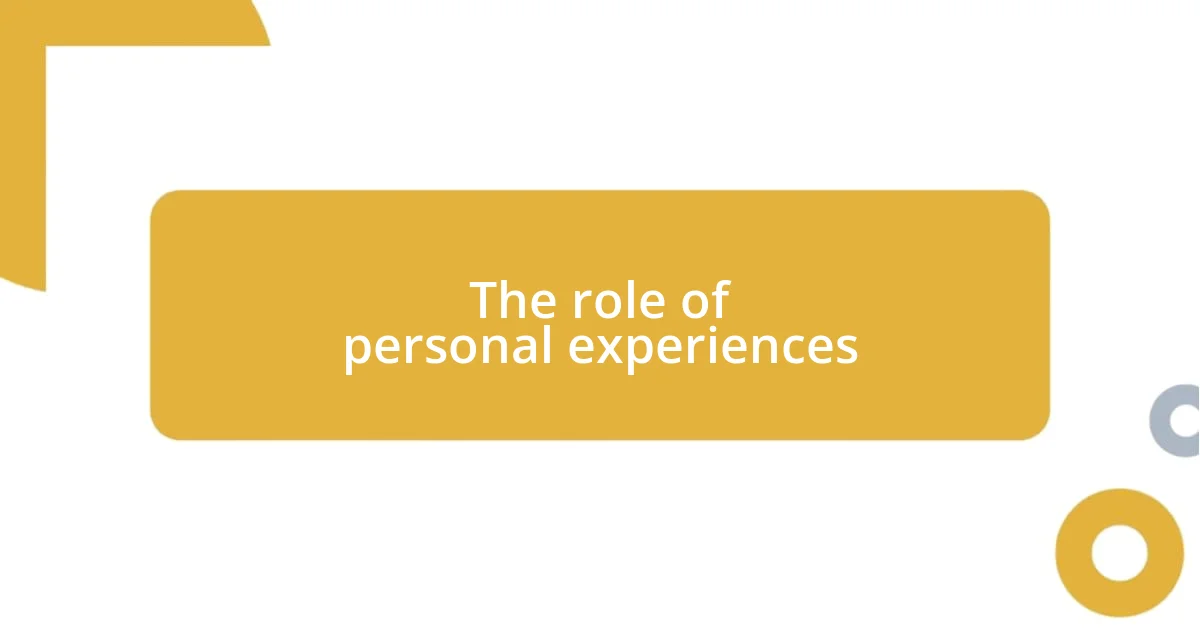
The role of personal experiences
Personal experiences are the backbone of my writing about tracks. I remember the first time I attended a live concert; the energy in the air was infectious, and it opened my eyes to how music can create a shared experience that binds people together. Have you ever felt a song resonate with a specific moment in your life? Those are the tracks that stick with us, embedding themselves into our personal narratives.
Reflecting on my own journey, I’ve noticed how certain tracks can evoke vivid memories, almost like a time capsule. For instance, every time I hear a particular song from my youth, I’m transported back to carefree summer days spent with friends, laughing and singing without a care in the world. These memories add depth to my writing because they’re not just about the music; they’re about the emotions it stirs within me.
Moreover, it’s fascinating how personal experiences shape our interpretations of tracks. I often wonder: how does a song’s theme change when seen through the lens of our unique life experiences? When I write, I draw upon my own struggles and triumphs, allowing that vulnerability to connect with readers who may feel the same. Each track becomes a story, intertwined with not just notes, but the essence of who we are.
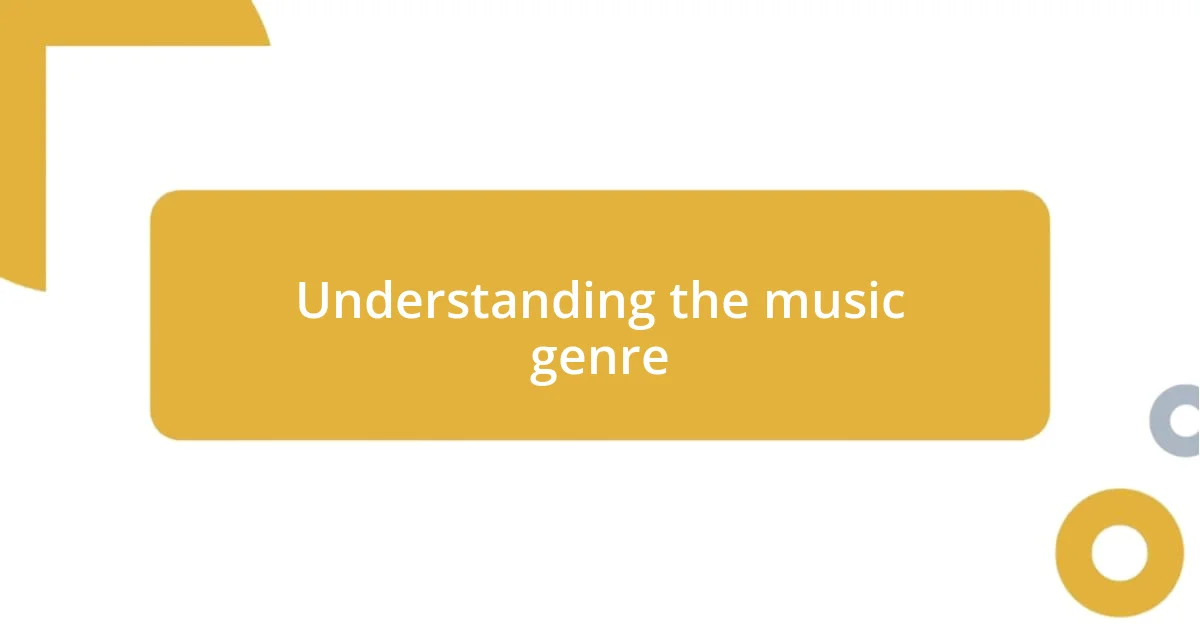
Understanding the music genre
Understanding the music genre helps me appreciate the diverse landscapes that shape a song’s identity. Each genre comes with its own culture and emotional undertones, influencing not only how the music sounds but also how it feels. For example, when I immerse myself in jazz, I’m not just hearing melodies; I’m experiencing a rich history of improvisation and freedom that evokes a sense of spontaneity and creativity.
When I compare hip-hop to classical music, the differences become even more apparent. Hip-hop often tells stories from the streets, giving voice to struggles and aspirations, while classical music transports me to grand ballrooms and serene landscapes, each note carefully crafted with intention. This awareness of the genre’s nuances deepens my connection to the music and informs my writing—having this knowledge in my toolkit allows me to convey richer narratives that resonate with diverse audiences.
Knowing how genres evolve and intermingle is essential for understanding modern tracks. Take, for instance, the rise of lo-fi music, which combines elements from hip-hop and ambient soundscapes. I often find myself studying these crossovers because they tell two stories at once, revealing how artists push boundaries and create something entirely new. This exploration of genres fuels my passion and elevates my writing as I attempt to capture the essence of these transformations.
| Genre | Key Characteristics |
|---|---|
| Jazz | Improvisation, syncopation, and emotional expression |
| Hip-hop | Rhythmic vocal style, storytelling, and cultural commentary |
| Classical | Structured compositions, orchestral arrangements, and historical depth |
| Lo-fi | Relaxed beats, recorded imperfections, and atmospheric sounds |
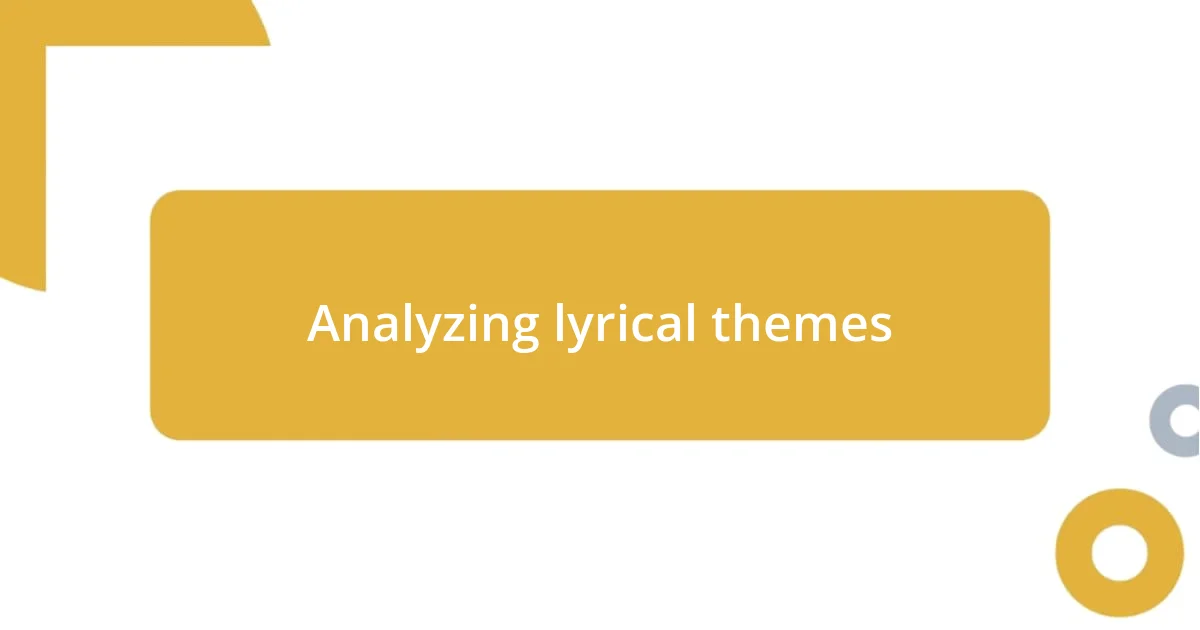
Analyzing lyrical themes
Analyzing lyrical themes can be a profound experience. I remember one time listening to a song that got me thinking about the complexities of love. The lyrics intertwined vulnerability and strength, capturing the bittersweet dance of relationships. It made me reflect on my own experiences, how love can uplift yet weigh heavy on one’s heart. This exploration often leads me to question the stories behind the lyrics and what inspired the artist to weave such intricate emotions into their work.
When I delve into lyrical themes, I often break down the songs to identify key elements that resonate. Here are some themes I frequently analyze:
- Love and Relationships: The highs and lows, moments of joy and heartache.
- Identity and Self-Discovery: The journey of finding oneself amidst societal pressures.
- Social Issues: Commentary on politics, injustice, or cultural movements.
- Nostalgia: Reflections on the past and cherished memories.
- Resilience: Overcoming adversity, personal growth, and empowerment.
These themes not only offer a mirror to society but also provide a window into the artist’s soul. It’s this connection with the music that keeps me motivated in my writing. How do these themes reflect your own journey?

Exploring the artist’s background
Exploring an artist’s background can reveal layers of meaning behind their music. For instance, when I learned about a singer-songwriter who grew up in a small town, it struck me how their lyrics often reflect a yearning for broader experiences. It made me realize that personal geography—whether a bustling city or a quiet country road—can profoundly shape an artist’s style and themes.
I often find myself intrigued by the influences that mold an artist’s identity. Was their childhood filled with the sounds of their parents’ vinyl records, inspiring the unique blend of genres I hear today? Learning about where they come from gives me deeper insight into their creative process and often sparks a connection to my journey as a writer. It’s fascinating how those early environments influence not just the music, but the stories they choose to tell.
As I think of an artist’s upbringing, I recall how it often intertwines with their struggles and triumphs. For example, discovering that a musician battled social anxiety made me appreciate the bravery it took for them to express such vulnerable sentiments in their work. How much courage does it take to share one’s inner world? This awareness enriches my writing, as I strive to capture the essence of their experiences, making the final analysis feel more authentic and relatable.
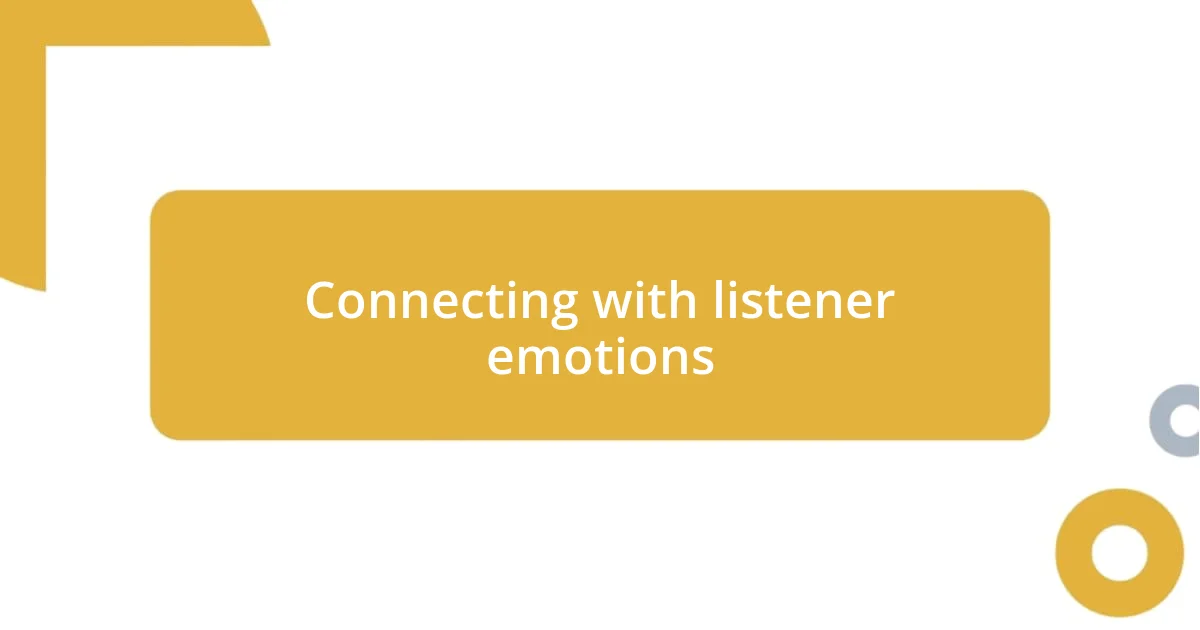
Connecting with listener emotions
Connecting with listener emotions is truly at the heart of why I write about tracks. I remember listening to a powerful ballad that drew tears from my eyes. The artist’s raw vulnerability struck a chord, igniting memories of my own heartaches and joys. It’s moments like these that remind me of the immense power music has to evoke feelings we often struggle to express.
When I write about a song, I often wonder how it makes listeners feel in their own lives. Have you ever found yourself lost in nostalgia while a particular melody plays? That feeling of being transported back to a specific moment is something I cherish. I think about how a simple chord change can ignite a flood of memories—those little details make all the difference in connecting with the audience.
I strive to articulate that emotional journey in my writing. For instance, I recently analyzed a track about resilience. As I listened, I felt a sense of empowerment wash over me, echoing my own battles. This led me to share my personal struggles, creating a bridge between the song’s message and my experience. Crafting those connections makes my writing resonate on a deeper level, inviting readers to find their own stories within the music. How do you relate to the emotions conveyed in your favorite tracks?
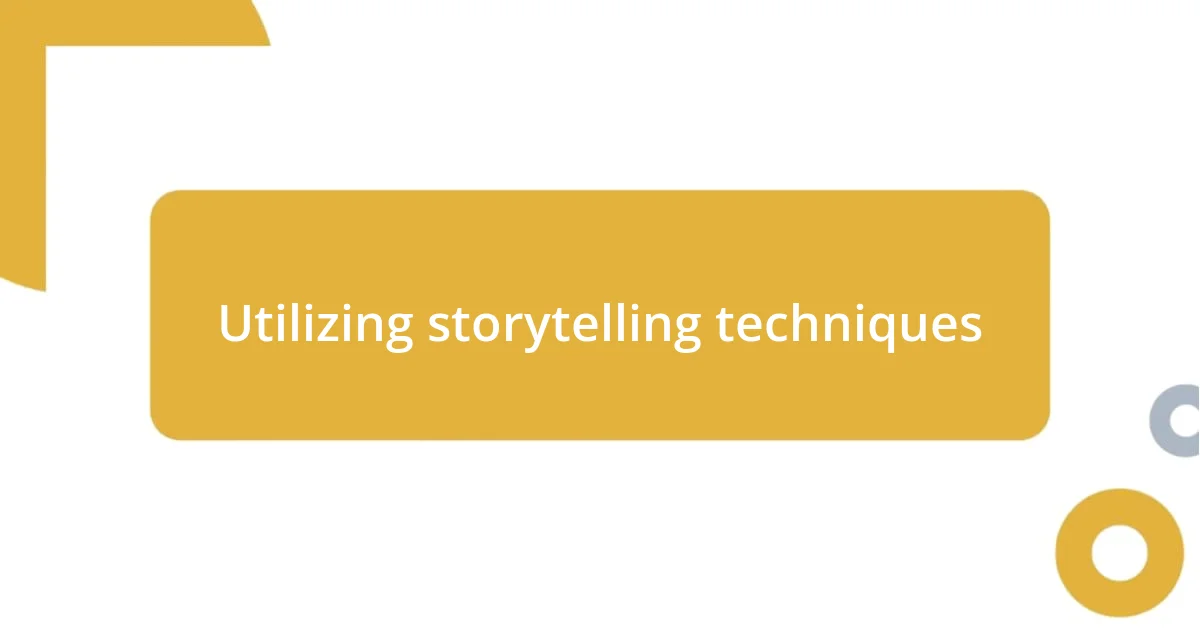
Utilizing storytelling techniques
Utilizing storytelling techniques transforms how I approach writing about tracks. I remember a time when I listened to a song that seemed to unfold like a mini-narrative. With each verse, the artist transported me through a journey filled with vivid imagery and emotion. This experience opened my eyes to how a simple melody can encapsulate an entire story, making me eager to unearth those layers when I write.
One technique I often apply is the art of setting the scene. Just like an author crafts a vivid backdrop for characters, I delve into the details of a song’s context. For instance, when analyzing a track that speaks about summertime adventures, I recall my own late-night drives with friends, windows down, laughter echoing. This personal connection allows me to paint a more relatable picture for my readers, making them feel like they’re right there, experiencing it alongside me.
I also appreciate the narrative arcs in songs, which can mirror our lives in powerful ways. Each rise and fall in a melody often echoes the ups and downs we face. Isn’t it fascinating how a song can reflect your own story? That realization encourages me to explore the transformative power of music further. Through storytelling, I create a richer experience that encourages readers to reflect on their personal connections to the tracks we’re exploring.
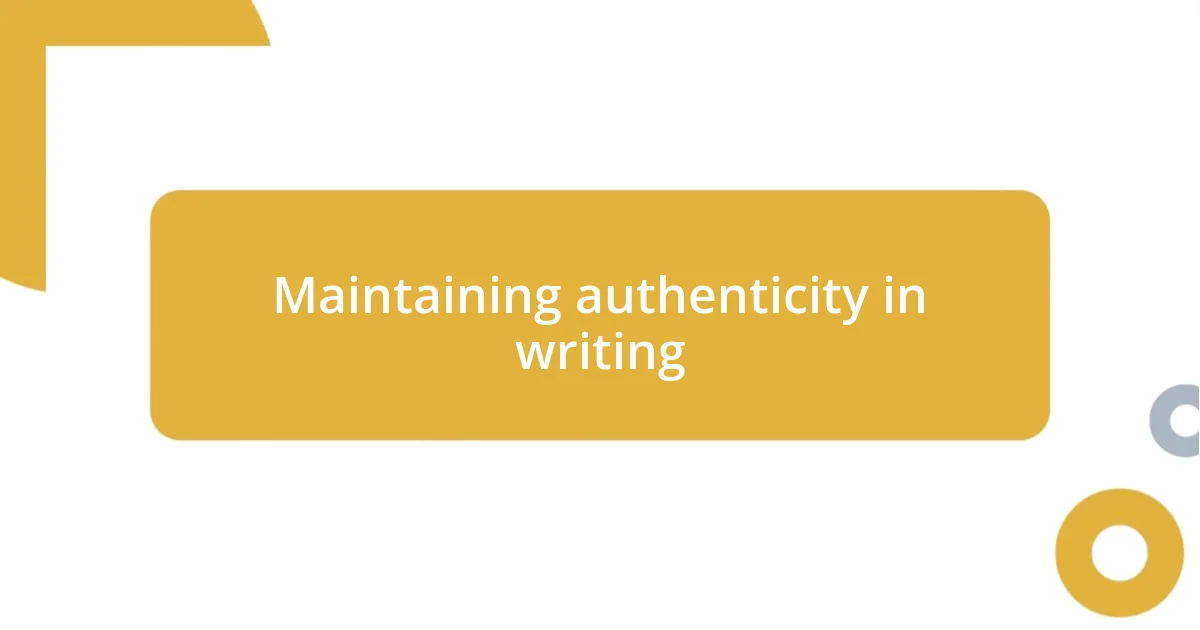
Maintaining authenticity in writing
Maintaining authenticity in writing is something I deeply value. When I put pen to paper (or fingers to keyboard), I prioritize genuine emotion over perfection. I recall a moment when I hesitated to share my thoughts on a song that felt dear to me. Rather than overthinking, I allowed my feelings to flow freely, and that rawness resonated with my readers. Have you ever felt that moment when being honest makes all the difference in how an idea lands?
I believe that being authentic invites vulnerability, which can be uncomfortable yet rewarding. Take, for instance, a track that speaks of loneliness. When I wrote about it, I didn’t shy away from discussing my own experiences with isolation. In sharing my story, I noticed readers reaching out to say they felt less alone. Isn’t it incredible how our shared experiences can forge connections? It reminds me that when we embrace our true selves, we tap into a universal language that transcends barriers.
I often reflect on the significance of staying true to my voice. Each artist has a distinct way of expressing themselves, and I strive to echo that individuality in my writing. Recently, I found myself inspired by an artist whose quirky lyrics spoke to my comedic side. I decided to incorporate playful honesty in my own writing, mirroring their unique charm. That authenticity not only made my writing enjoyable but also helped foster a more genuine connection with those reading it. What aspects of authenticity do you value in your creative endeavors?




